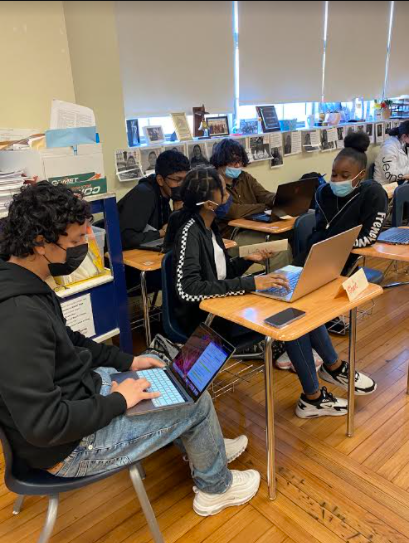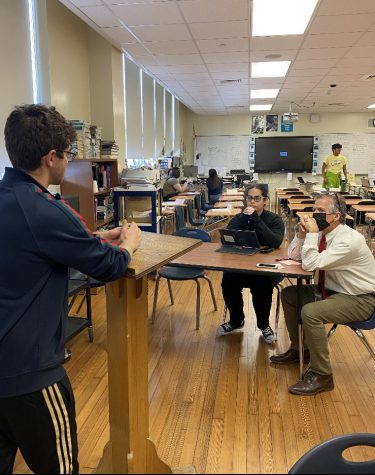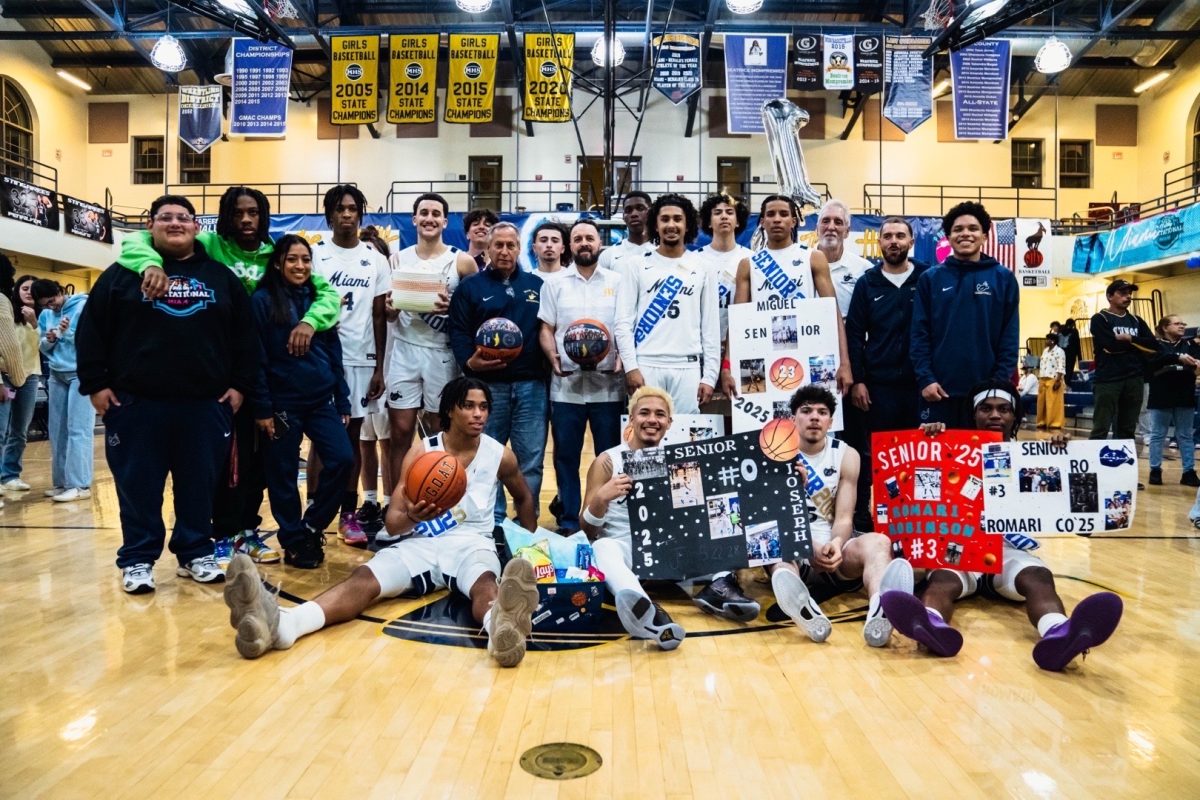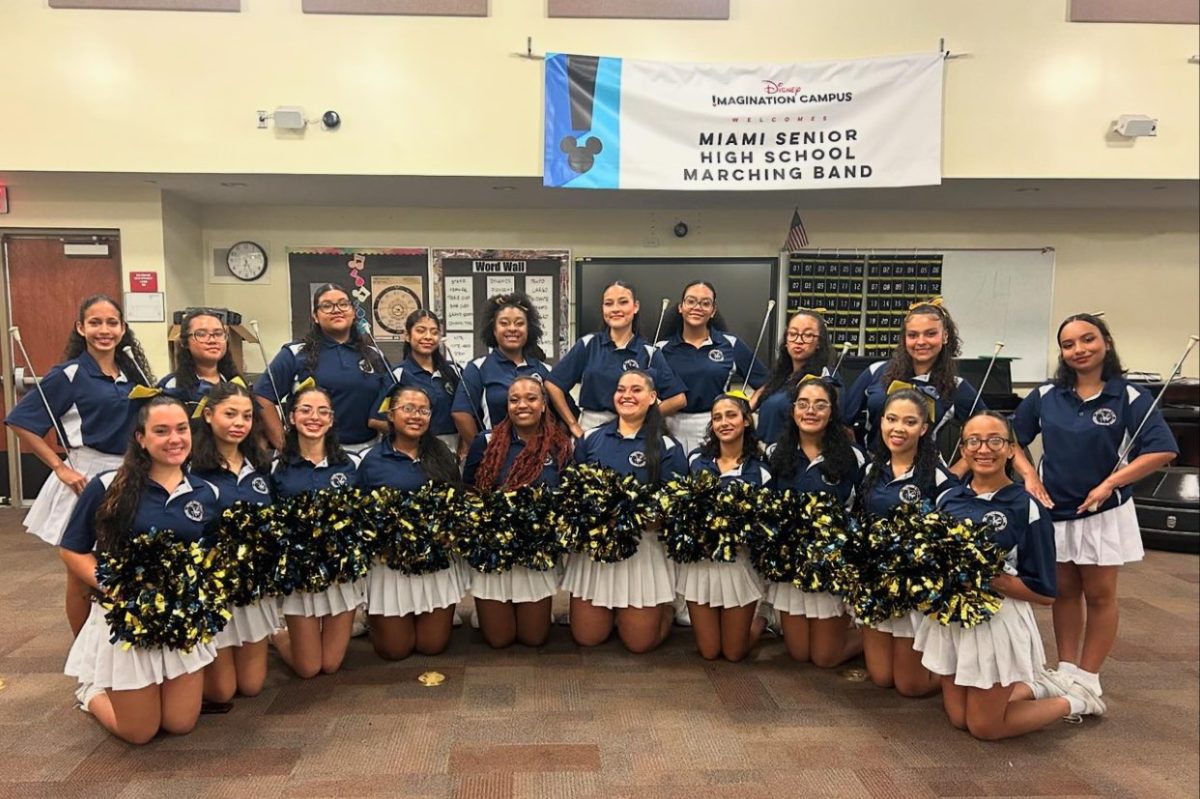Why You Should Get Your AP Capstone Diploma

AP Seminar students working diligently on their presentations.
December 16, 2021
The moment I saw my AP Capstone Diploma, I knew that memory was not going to fade as quickly as the others. My name written in big, bold letters almost mimicked how I felt during my AP Research presentation in front of a faculty panel. College Board representative Trevor Packer’s signature on my diploma almost foreshadowed the award letter I would receive months later when I would find out that my performance in AP Research had earned a perfect score. My Capstone journey was a long one, but one that I treasure and would not trade for the world.
The AP Capstone program from the College Board is offered to high school students who pass two yearlong courses: AP Seminar and AP Research. Aside from those two courses, an AP Capstone candidate must also take and pass four additional AP classes of their choice with a score of 3 or higher.
At Miami High, it takes as little as two years to complete all the requirements. In fact, you can actually start preparing for the diploma before you even arrive to high school. If you attended a middle school that offered an AP course and passed that course, you have already completed one of the four additional AP classes required. The four additional AP classes may also be taken throughout high school.
During sophomore or junior year of high school, an AP Capstone candidate takes AP Seminar, and during junior or senior year, AP Research. According to the College Board website, “these courses develop students’ skills in research, analysis, evidence-based arguments, collaboration, writing, and presenting.” English teacher Mr. DeNight teaches both courses. See him in room 1219 for further inquiries about AP Capstone.
I took AP Seminar my sophomore year (2019-2020) and AP Research my junior year (2020-2021). In eighth grade, I took and passed AP Spanish Language. During my sophomore and junior years, I took and passed AP Biology, AP Psychology, and AP English Language and Composition, fulfilling the four additional AP class requirement.
My senior year I’m taking AP Statistics, AP Human Geography, AP Government, and AP Macroeconomics. Needless to say, there are many opportunities and AP courses that cater to each student’s interests, so everyone has an opportunity to explore their interests while simultaneously completing their requirements for the Capstone diploma.
In fact, sophomore Sebastian Lafond is taking AP Seminar as well as AP Spanish Language and Culture. He says there are innumerable benefits to the Capstone program. Ms. Wilcox, one of his former English teachers, recommended he take the course since he is such a talented writer. Sebastian says he is excited to collaborate with others and share his ideas during the collaborative essay-writing-and-presentation component of AP Seminar.
In spite of not knowing what exactly he wants to dedicate his life to, Sebastian says, “I know that taking AP Seminar and Research will help me in any career path I choose.” Sebastian recommends the Capstone program to all of his friends and plans to take AP Research his junior year.
Former AP Seminar student and current AP Research student senior Gabriel Ferrer made similar remarks, praising Mr. DeNight for his unique and highly effective teaching strategies. “Mr. DeNight is really good at explaining the expectations of the class and does a really good job engaging with his students,” says Gabriel, whose AP project is geared toward the experience of ESOL students who are learning English. In his study, he wants to find out how these students, who often do not participate in school-wide events because they are preoccupied with learning English, can become more involved with the extracurricular, fun part of school.
Being that Gabriel himself was once in the position of the subjects in his study and that he is the Vice President of BETA, the school’s largest honor society, it makes sense why he would choose a topic he is familiar with. In fact, Capstone students are given a lot of freedom to choose the topics that they investigate. This is what makes the Capstone program so unique: it is versatile.

Former AP Research student senior Ginelle Servat says that AP Capstone was always her favorite class: “I loved Mr. Denight because he always corrected my writing in a way that I would remember, so I don’t make the same mistake again.”
She really enjoyed AP Research, commenting, “I like that I was able to choose my own topic and really learn at my own pace.” Majoring in engineering, Ginelle says that although she won’t be writing academic papers for the large majority of her career, her training in Capstone has taught her how to research and identify reliable sources.
When asked what type of students should take AP Capstone, Mr. DeNight responded, “Definitely the kids that know they want to go to college.” He explained that Capstone offers students a close look at how demanding college classes really are, particularly “learning to write academic prose, making claims about serious issues in the world, and supporting your claim with evidence from sources you’ve investigated and confirmed are reliable.”
AP Capstone Diploma recipient and Miami High alumna Amanda Sanchez passed AP Seminar, AP Research, AP Spanish Language and Culture, AP Spanish Literature and Culture, AP Chemistry and AP Calculus. Amanda took AP Seminar her sophomore year and took AP Research her senior year, using her junior year to take more AP classes. Now completing her associate’s degree requirements at Miami Dade Honors College, she said, “Taking AP Capstone really helped me because there are many writing assignments in college, so all the writing and reading practice I did in high school is really paying off.”
Mr. Cuevas, chair of Miami High’s counseling department, defined the work completed in Capstone as “work that’s going to benefit you in the long run because you’re gaining a skill that is going to help you tremendously when you get to college.” He emphasized that a lot of what is done in college is done through peer interaction not so much pen and paper as in high school, so taking Capstone will allow you to refine those communication skills.
However, he cautioned, “You have to be committed to it. It’s not going to be an easy class, and it’s not intended to be an easy class.” He believes that all students benefit from the program whether they are looking to have a career in the medical, scientific, educational, or even the legal field.
Mr. DeNight says that outstanding juniors who take all required AP classes before their senior year benefit the most from the Capstone program since they are able to receive the diploma before graduating. Unfortunately, seniors that complete the Capstone program can still get their diploma but they have to wait until July after graduation when AP scores are released.
Just like Mr. Cuevas, Mr. DeNight says that all career paths benefit from the program, and that both STEM (Science, Technology, Engineering, and Math) oriented students as well as English and Social Studies oriented students learn new skills and refine old ones. He says, “The STEM kids really benefit from using the scientific method in real life. The non-STEM kids really value the opportunities to read, to interpret text, and to express themselves in their own reports.”
When applying to college, admissions officers from renowned universities see that you have received a Capstone diploma and automatically realize that you are a determined, intelligent, hard-working student, increasing your chances of being admitted into the university. To put into perspective, a Capstone diploma of distinction holds the same weight and prestige as an International Baccalaureate diploma. So when you graduate, you will be graduating with not one but two diplomas: the normal high school graduation diploma and the AP Capstone diploma.
AP Classes Offered at Miami Senior High School:
- AP English Language & Composition
- AP English Literature
- AP Calculus AB
- AP Calculus BC
- AP Biology
- AP Chemistry
- AP Physics 1
- AP Computer Science
- AP Psychology
- AP Macroeconomics
- AP Government
- AP United States History
- AP European History
- AP Human Geography
- AP Capstone Seminar
- AP Capstone Research
- AP Studio Art: 2D Design
- AP Art-Drawing






Mahmoud Mansour • May 18, 2022 at 10:34 am
I loved this article, it was amazing.